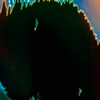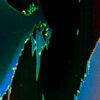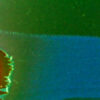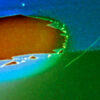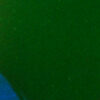In partnership with Silver Press and The Ursula K. Le Guin Literary Trust, Granta publishes the winner and runner-up of The Space Crone Short Story Prize for speculative and science fiction. ‘Green Shade’ by E. De Zulueta is the runner-up.
I am swimming towards the strange island, with my hair floating around me like a sea anemone, I swim like a plastic bag, like a squid.
Woken at dawn, I have overslept and we are leaving on patrol. The morning holds the imprint of the night before. My head is a carnival of neuronic torture, I vomit quietly into the bushes when the others are not looking. We are hungover and subdued as we leave the base and the jungle responds to our mood. Its noises are muted, the canopy shudders under the passage of animals moving through the treetops, in the dim light I can barely distinguish these muffled forms. With each step the carnival fades and I enter a deep calmness. The jungle itself presents little threat to us, ground herbage is sparse, large predators are rare.
We move through the shadowy undergrowth like drifting debris, rather than gaining ground I have the impression we are washing gently forwards and back, a tidal tug returns us to where we started. Underwater I can hear the hissing of the sand and pebbles.
At dusk, the screams of the insects deafen us and we are forced to communicate with hand signals and elaborate grimacing. The crepuscular moment overpowers us. We eat without talking, the meal is cold to prevent cooking smells from giving away our presence. As darkness falls, we crawl into our tents and try to sleep. We have heard that they like to attack at night. The first you would know about it would be the gunfire slashing up your tent, says Slammer. Better that than being dragged out and beheaded, says The Wolf. As long as it’s quick, says I.
We arrive at the foot of the mountain, which means we have walked for three days. I had not noticed the time passing. The mountain stretches above us, a strange raw crouching mass, entirely granite and without foliage on its upper slopes.
At first the climb is gentle, as we emerge above the tree line we breathe a collective exhalation, a sense of relief as if we had woken from some shared hallucination. We laugh and look at each other as if seeing ourselves for the first time. There is something inhuman in our appearance, in the white light that filters through the clouds our exposed skin is as grained and striated as stone, our grey bodies as awkward as boulders.
The incline steepens, the air thins and a wind whips across the barren face of the mountain.
Kneeling on the bank, the body is floating just below the surface, the water rippling gently over his face which is pale, his neck is multi-coloured, marbled blue, purple, green, pink, black. His expression is thoughtful, perhaps slightly disappointed. Thin tendrils of river plants are caught around his head, forming a green halo.
I wake with the impression that it was the sound of voices and movement that disturbed me, but there is only darkness and the blustering of the tents in the wind. The hugeness of the open sky above our camp is oppressive, we had become used to living underneath the canopy, like a lid.
Ha ha ha, tell it again
But I just told it
Tell it again
As we climb the upper slopes our mood is light and hysterical, Jam is demanding stories, he likes stories with a horror grab. He is addicted to the small shocks, however predictable and worn out from repetition.
We do not feel them latching on and often only discover them when they are already bloated with blood. They hang from branches and leaves, swinging their little grey bodies in the air, as they loop towards passing animals, punctuating the jungle like floating apostrophes. The flame of a lighter can be used to remove them. Never try to pull one away alive because its head will stay embedded under the skin and will fester. Infection in the jungle means death.
A small crowd has gathered in the clearing at the centre of the base in anticipation of the show, I stick to the edges of the group, I don’t feel like talking. Tomorrow we leave on patrol. The evening is weighted with suspense and the tension is making us drink quickly and recklessly. I edge to the side of the haphazard stage that has been erected. The babble of the crowd is escalating in excitement until someone climbs onto the stage and is greeted by a sudden silence.
It is Jam in a red dress, his hair has been slicked back with wax. His ears protrude in an unbearably tender manner, he is cleanly shaven, his eyes are framed by thick black lines and his lips are a quivering pale pastel. The sight takes my breath away. The crowd regains its voice and Jam delicately blushes among the animalistic shrieks and crunching of camera phones. He begins to sing.
In the land of my dreams, you’re sweeter than ever before
In the land of my dreams, you love me so much more
I am over here so I’ll stay, you’ll never stay
If they could only be real, instead of just in my head
In the land of this wonderful dream, I imagine you oh so close
Telling all of the girls who love you too, you love me the most
And when you walk by, I start to laugh and dream and glow
Cause when I want to be with you, I close my eyes and away I go, go, go
The crowd follows each faltering note to its apex. It is not only I who weeps quietly, I am surrounded by faces that have sunken and whose eyes are glassy, cheeks hollowed, tongues gagging, our bodies are disorganising, mouths open to expel those phantom organs which now feel warmth, feel touch, feel love. Our love for ourselves, as if we had never believed in it before, had never expressed it!
As we sing, we become indistinguishable from one another, a fluorescent soup of consciousness, a wonderful creature of many legs and heads, crawling through bogs and thickets, a humble element of the jungle ecosystem, we are responsible for spreading the seeds with our feet, clearing areas of shrubbery for grazing, and fertilising the soil with our excrement.
I dreamed last night of stumbling upon the banks of a wide river, out of the water emerged a fish, he was covered in fur of many colours, he was so beautiful that I asked him to come with me and we went home to the camp and were married.
A fever of unknown causes, the medic has written to the farm. The message will take weeks to be received, if it ever is. On our return from patrol we find the base depleted, four men have been winched out. Delirious and chattering like the birds of the jungle, the fever made their bodies hot and metallic like curious little incubation chambers, cooking up who knows what.
This is how it goes. We raise our arms upwards, then outwards towards each other, we circle each other slowly, slowly, falling to the ground we drag ourselves through the thick mud with our elbows then stand motionless as bullets are fired into our vests, we tap plants for water, the sap inebriates us, we run screaming towards each other with knives, we crawl across sharp rocks on our knees, salt water is poured onto our wounds, we drink the blood of jungle snakes and rinse our mouths with urine, facing a mirror we dance slowly watching each other, sliding up and down, folding our bodies backwards and forwards, we enter submerged cave networks and swim through the tunnels with a razor blade held between our teeth, we navigate using only the sun, using only our memories, we dip the rat in oil before we eat it, eat it, we break paving slabs with our hands, we break bricks with our heads.
The photo is of a man, he is wearing a uniform of disruptive pattern material, he stands facing the camera, his legs relaxed, slightly apart, he smiles bashfully, he holds out his hands to the camera, in each hand he holds a head. She finds the image in the depths of an inactive chatroom, she keeps returning to it, every time she goes down she brings it closer to the surface. She tries to find it in higher resolution so she can see more clearly. The image is blurred, the sight of a severed head is hard to understand, it resists recognition, it appears almost two dimensional, like a mask.
Dear J, I wonder how I am supposed to understand your silence, I have always found it difficult to read your thoughts, across this distance I find it impossible. The longer the silence the more obsessively my mind fixes on you but the less real you seem. It occurs to me that you were never very present even when you were.
I could write to tell her that the jungle is home to the largest flower on the planet, it is called the corpse flower. They call it this because it stinks of rotting flesh, it is pollinated by carrion flies who are attracted by the smell. It has no stem, no roots or leaves, it exists as a network of thread-like mycelium which embed themselves intimately into the tissue of its host, drawing from these tissues everything it needs to survive. When it is ready to reproduce it sends out reddish-brown knobs which grow into huge fleshy flowers. I wonder if every person is simply an endless series of variations on the same theme, the same flaw.
I was on the banks of the river again last night. I reach out in the moonlight towards my fish bride and cup her breast, she laughs, do you imagine then that you are my husband? Her laughter echoes among the trees, it is as if all the jungle is laughing, the noise is overwhelming, hail stones and lightning rain down, I try to run but my body below my neck has become rock. I watch powerless as the petrified bodies of my friends fall into the river.
I exist for many years in this place as a living head upon a stone body. At first the friendly inhabitants of the model villages try to behead me to end my suffering, but none are able.
One day a woman hears my cries and comes to the riverbank, she strikes my neck first with a knife, then an axe, then a machete but nothing leaves a mark. Finally, she heaves a slab of granite from the riverbed and lets it fall.
Crushed under its weight I am silenced. My head turns to stone.
Image © 826 PARANORMAL


